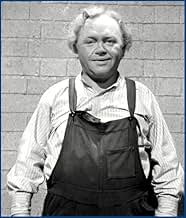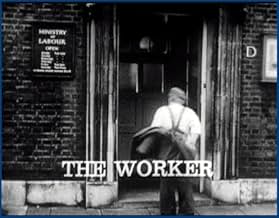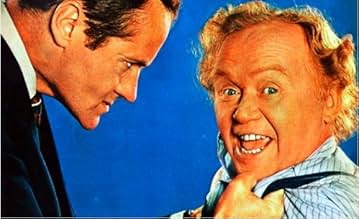अपनी भाषा में प्लॉट जोड़ेंIn twenty years Charlie has had a thousand jobs. Each week sees Charlie attend the Labour Exchange to try and get a new one.In twenty years Charlie has had a thousand jobs. Each week sees Charlie attend the Labour Exchange to try and get a new one.In twenty years Charlie has had a thousand jobs. Each week sees Charlie attend the Labour Exchange to try and get a new one.
एपिसोड ब्राउज़ करें
फ़ोटो
कहानी
क्या आपको पता है
- ट्रिवियाThe theme song, 'Only a Working Man' (Herbert Rule and Fred Holt) dates at least as far back as 1927 when it was recorded by Lily Morris.
- कनेक्शनFeatured in Arena: Drake's Progress (2001)
फीचर्ड रिव्यू
This is an extraordinary show. Charlie Drake was never a fashionable comedian, and some of his films are abysmally sentimental and childish. Yet this wonderful comedy, which ran for five series, about an accident-prone unemployable layabout contains some of the most inventive, stylised and downright weird sequences in British TV comedy. It is almost theatre of the absurd, as the inevitable course of events unfolds in a world where failure is the only outcome, propelled by the infernal machinery of the labour exchange. The gallows humour, tragicomic outlook, theatricality and bleak minimalism recall the works of Samuel Beckett more than Drake's variety-comedian peers. Realism of sets and costume are undermined by stylised dialogue, incessant repetition, absurd situations and Drake's constant breaking of the fourth wall, looking at camera and pretending to conduct the orchestra when the theme tune begins.
Each programme had the same structure. Charlie would enter the labour exchange, and explain to a long-suffering official why he had lost his last job. The official, a regular character, was Mister Pugh (Henry McGee) from the second series on, a wonderful piece of casting and a perfect foil for Drake, humourless, choleric and hysterical. Eventually, frustrated by Drake's rambling monologues, idiotic explanations, wilful stupidity and constant mispronunciation of his name (as 'Mi'tah Poo', which became a popular catchphrase in the 1960s), Mr Pugh would grab him by his dungarees, pull him physically off his feet and over the counter, and threaten him. He would finally give Charlie the address of a firm with a vacancy, usually telling him this was his last chance.
Charlie would turn up at the firm, and announce himself using the same words each time: "Good morning, I'm Charles Drake, casual labourer of Weybridge, come for the job in the vacancy". A surreal scene with a receptionist would usually follow, and we would have the commercial break.
In the second part of the show, Charlie would be introduced to his new boss, and proceed to make a hash of the job, usually wrecking the workplace. The comedy would be once more a strange contrast of traditional slapstick and stylised, satirical spoofs of current mores, be they management fads, silly fashions, current obsessions.
This really is a unique show. It has a cumulative effect - it is easier to 'get' what is going on if you watch more than one show. A single show in isolation appears to be completely mad.
Each programme had the same structure. Charlie would enter the labour exchange, and explain to a long-suffering official why he had lost his last job. The official, a regular character, was Mister Pugh (Henry McGee) from the second series on, a wonderful piece of casting and a perfect foil for Drake, humourless, choleric and hysterical. Eventually, frustrated by Drake's rambling monologues, idiotic explanations, wilful stupidity and constant mispronunciation of his name (as 'Mi'tah Poo', which became a popular catchphrase in the 1960s), Mr Pugh would grab him by his dungarees, pull him physically off his feet and over the counter, and threaten him. He would finally give Charlie the address of a firm with a vacancy, usually telling him this was his last chance.
Charlie would turn up at the firm, and announce himself using the same words each time: "Good morning, I'm Charles Drake, casual labourer of Weybridge, come for the job in the vacancy". A surreal scene with a receptionist would usually follow, and we would have the commercial break.
In the second part of the show, Charlie would be introduced to his new boss, and proceed to make a hash of the job, usually wrecking the workplace. The comedy would be once more a strange contrast of traditional slapstick and stylised, satirical spoofs of current mores, be they management fads, silly fashions, current obsessions.
This really is a unique show. It has a cumulative effect - it is easier to 'get' what is going on if you watch more than one show. A single show in isolation appears to be completely mad.
टॉप पसंद
रेटिंग देने के लिए साइन-इन करें और वैयक्तिकृत सुझावों के लिए वॉचलिस्ट करें
विवरण
- चलने की अवधि30 मिनट
- रंग
- ध्वनि मिश्रण
- पक्ष अनुपात
- 1.33 : 1
इस पेज में योगदान दें
किसी बदलाव का सुझाव दें या अनुपलब्ध कॉन्टेंट जोड़ें











